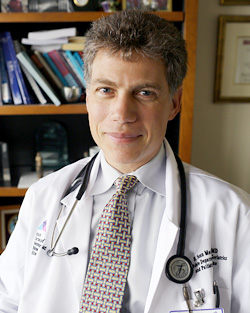
Director, National Palliative Care Research Center
Director, Hertzberg Palliative Care Institute
Professor, Departments of Geriatrics and Palliative Medicine, and Internal Medicine
Icahn School of Medicine at Mount Sinai
Biography
Dr. R. Sean Morrison is Director of the National Palliative Care Research Center, a national organization devoted to increasing the evidence base of palliative care in the United States. He is also the Director of the Hertzberg Palliative Care Institute; Professor of Geriatrics and Medicine; and Hermann Merkin Professor of Palliative Medicine in the Brookdale Department of Geriatrics and Palliative Medicine at the Icahn School of Medicine at Mount Sinai in New York City. During 2009-2010, he served as President of the American Academy of Hospice and Palliative Medicine.
Dr. Morrison is the recipient of numerous awards, including a American Academy of Hospice and Palliative Medicine PDIA Palliative Medicine National Leadership Award, Excellence in Research Award, Presidential Citation to the National Palliative Care Research Center, and Visionary Award; the American Cancer Society’s Distinguished Achievement in Cancer Award; the American Geriatrics Society’s Outstanding Achievement for Clinical Investigation Award; the Open Society Institute Faculty Scholar’s Award of the Project on Death in America; a Paul Beeson Faculty Scholars Award; a Brookdale National Fellowship; and a Faculty Council Award from the Icahn School of Medicine at Mount Sinai. He is currently Principal Investigator of an NIA funded five-year multisite study on improving the management of pain in older adults.
Dr. Morrison has received over $35 million dollars in research funding and published over 120 research articles. His work has appeared in all major peer-reviewed medical journals, including the New England Journal of Medicine, Annals of Internal Medicine, and the Journal of the American Medical Association. He edited the first textbook on geriatric palliative care and has contributed to more than 15 books on the subject of geriatrics and palliative care. As one of the leading figures in the field of palliative medicine, Dr. Morrison has appeared numerous times on television and in print, including ABC World News Tonight, The Factor with Bill O’Reilly, the New York Times, the Los Angeles Times, USA Today, the Philadelphia Enquirer, the New York Daily News, Newsday, AARP, and Newsweek. He figured prominently in the Bill Moyers series On Our Own Terms, a four-part documentary aired on PBS and in Gail Sheehy’s new book, Passages in Caregiving.
R. Sean Morrison received his BA from Brown University and his MD from the University of Chicago Pritzker School Of Medicine. He completed his residency training at the New York Hospital-Cornell Medical Center followed by fellowship training at the Mount Sinai School of Medicine in New York City. He has been on the faculty of the Department of Geriatrics and Palliative Medicine and Department of Medicine at Mount Sinai since 1995.
Advance Care Planning: Moving beyond Advance Directives
Abstract
Patients with serious illness and multiple chronic conditions often experience untreated symptoms such as pain, breathlessness, fatigue, and anxiety; report low satisfaction with care; and receive medical treatments associated with discomfort and time away from family and friends that are not consistent with their overall wishes and goals. Advance directives, living wills and durable powers of attorney for healthcare were developed as a means for patients to influence their care should they lose the ability to make medical decisions in the setting of serious illness. The goal of advance directives was to better align treatments with patients' wishes and to ensure that patients did not receive unwanted, burdensome, or non-beneficial treatments. Difficulties operationalizing and accessing these paper documents at times when they were needed ed to the concept of advance care planning. Advance care planning, unlike an advance directive, is a process by which patients and clinicians identify their goals of care, discuss together treatments that achieve those goals, and identify states that they would consider “a fate worse than death. In this talk, I will review the history of advance directives and outline their evidence base. I will then discuss the process of advance care planning, review a series of studies examining the outcome of this process on clinical care for patients and families, outline new and innovative approaches to the advance care planning process (video, web-based guidance), and identify continuing needs and gaps. Finally, I will discuss a new concept of clinical decision making – “in the moment decision making” - that builds on the advance care planning process by facilitating decision making by surrogates at the time that decisions need be made. In the course of the presentation, I will use video examples to clarify and illustrate these core concepts.
